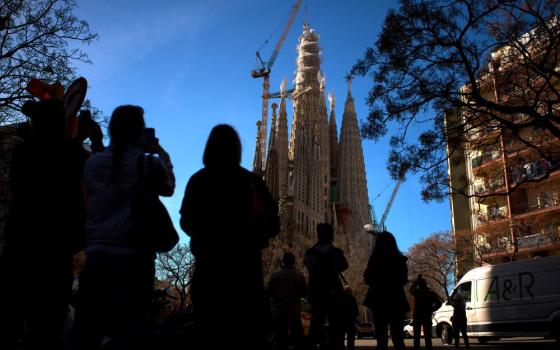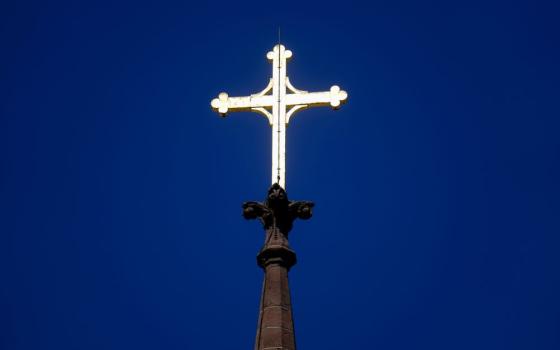
Attendees at the LCWR assembly carry a banner at the head of the Pilgrimage of Hope, a march through downtown Atlanta Aug. 14, where they sang and prayed for social justice. (GSR/Dan Stockman)
Editor's note: Global Sisters Report is covering the annual assembly for the Leadership Conference of Women Religious, this year held Aug. 12-15 in Atlanta, Georgia. Here, you can find regular updates and reflections from GSR staff.
Leadership transition: Sr. Debra Sciano becomes president-elect of LCWR
BY DAN STOCKMAN
August 15, 6 p.m ET
LCWR members said goodbye to one president Friday afternoon, Aug. 15, and hello to another.
The Leadership Conference of Women Religious, which represents about two-thirds of the nearly 35,000 Catholic sisters in the United States, has a three-person presidency, and their terms end at the end of the group’s annual assembly.
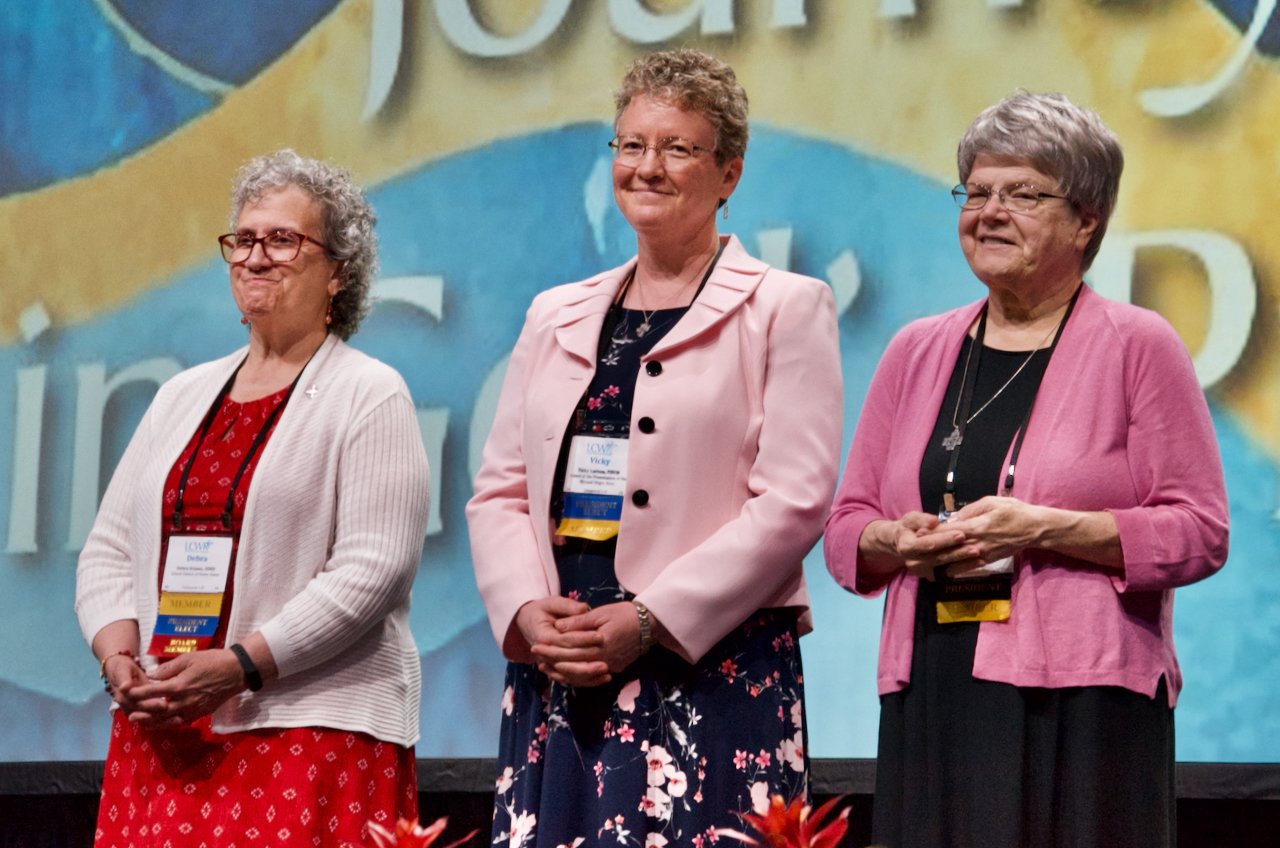
The 2025-2026 LCWR presidential team, from left: president-elect Sr. Debra Sciano, president Sr. Vicky Larson, and past-president Sr. Kathy Brazda. The trio accepted their offices Aug. 15 at the LCWR assembly in Atlanta. (GSR/Dan Stockman)
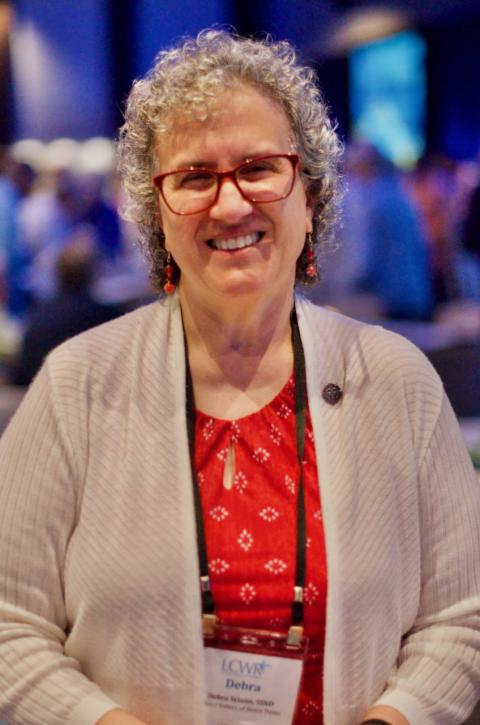
School Sisters of Notre Dame Sr. Debra Sciano, president-elect of LCWR. (GSR/Dan Stockman)
First, the group of nearly 600 sisters and nearly 300 guests thanked outgoing past-president Dominican Sr. Maureen Geary, who finished her three-year term on the presidential team. With her departure, Presentation Sr. Vicky Larson moved from president-elect to president; and St. Joseph Sr. Kathy Brazda became past-president.
The group then welcomed new president-elect School Sisters of Notre Dame Sr. Debra Sciano.
Sciano is a civil lawyer who has been an assistant district attorney for the State of Wisconsin, primarily representing children in need of protection and services, and a family mediator in Milwaukee. She has served as an LCWR region chair and member of the national board.
As part of the transfer and blessing of officers, regional chairs and national board members were recognized, thanked and given a blessing.
Friday panel shares how they keep the faith despite challenges in leadership
BY DAN STOCKMAN and HELGA LEIJA
August 15, 2 p.m. ET
The final day of the LCWR assembly, Aug. 15, began with a panel discussion, with three congregational leaders sharing how they stay grounded in hope despite the challenges of leadership.
The panel, titled Hope Unbroken: Staying Grounded in Leadership, was before the nearly 900 Catholic sisters and their guests who gathered for the Aug. 12-15 annual assembly.
Panelist Verbum Dei Sr. Sara Postlethwaite told the group she came into leadership at a time when several sisters suddenly left the order, which exposed unhealed wounds from a split in the congregation two decades before.
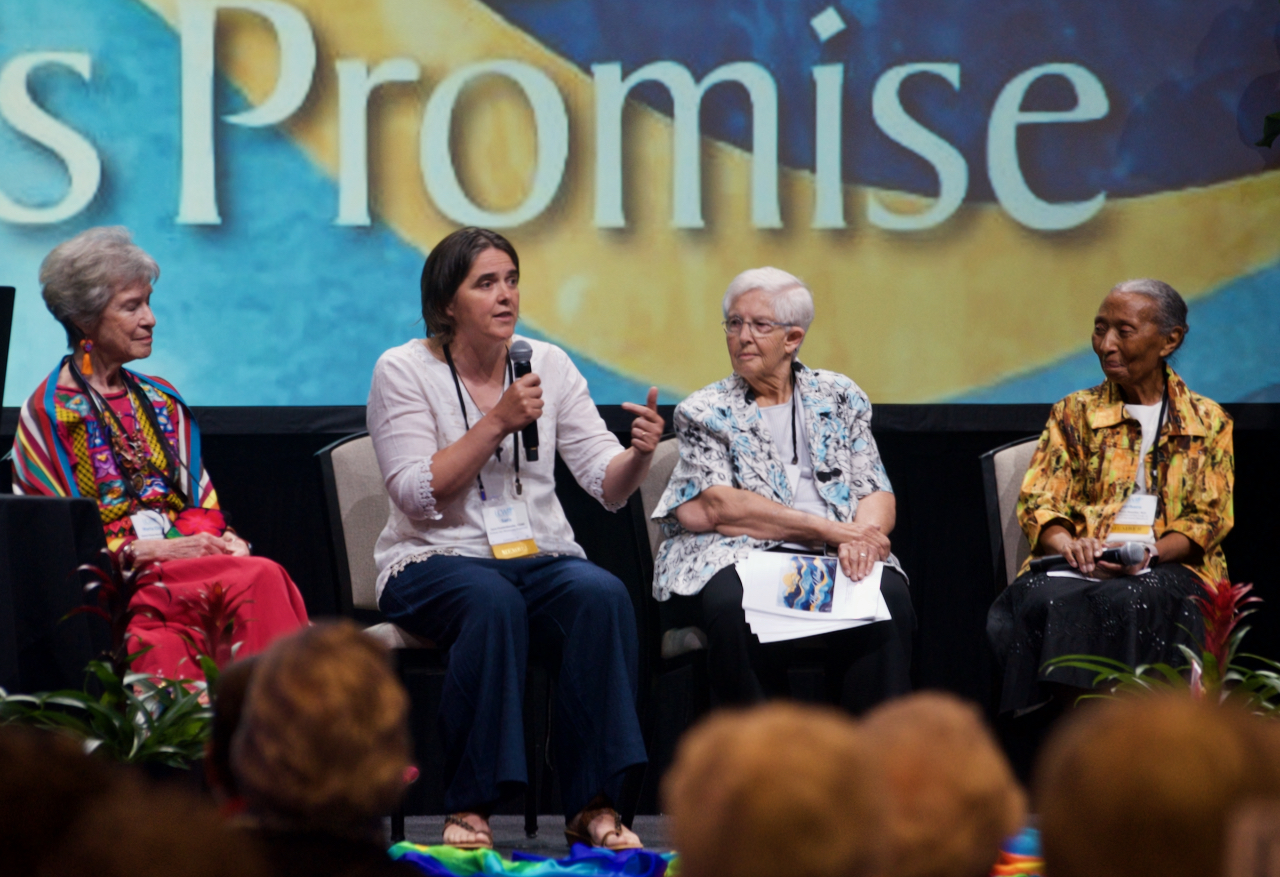
Franciscan Sr. Maria Elena Martinez (from left) moderates a panel discussion Aug. 15 on how leaders keep their faith, which included Verbum Dei Sr. Sara Postlethwaite, Mercy Sr. Pat McDermott, and Good Shepherd Sr. Barbara Beasley. (GSR/Dan Stockman)
A turning point came for her while praying with the story of Bartimaeus, a blind beggar Jesus healed. Frustrated with her community and the Church, she remembers hearing Jesus ask, "Do you trust me beyond the crowd?" — a question that still guides her leadership.
She's also found hope in the memory of a founding sister who, even on her last day, was planning for the community's future; in the faith of younger sisters in the community, and the hope that is present on the margins.
"A large part of our ministry is to migrants," Postlethwaite said. "God is there. Hope is there."
Mercy Sr. Pat McDermott said that what has kept her hope alive has been something she learned from Mercy Sr. Margaret Farley. When McDermott learned in 2012 that Farley, a widely respected theologian, was being investigated by the Vatican's Congregation for the Doctrine of the Faith over her 2006 book, Just Love: A Framework for Christian Sexual Ethics, McDermott asked her how she wanted to respond. Farley said she would need to consult with her committee before she decided.
"So I asked her, 'Who is on this committee?' And when she began listing names, I realized she was naming people who had already died," McDermott said. "I realized the wisdom of what she was saying, and I immediately formed a committee of my own."
Later, the community struggled with the challenges of the COVID-19 pandemic and the joining of seven Mercy congregations into one, the Sisters of Mercy of the Americas.
"Leaders must realize the care of the whole belongs to the whole. We dedicated our lives to God and each other, not to any leaders."
- Mercy Sr. Pat McDermott
Good Shepherd Sr. Barbara Beasley during the morning panel presentation Hope Unbroken: Staying Grounded in Leadership, at the LCWR assembly Aug. 15. (GSR/Helga Leija)
"What helped us during these times of immense and sometimes trying change? We are women of faith and we travel together in the hope of God," McDermott said.
She also said she learned that the leaders are just one piece of the puzzle.
"Leaders must realize the care of the whole belongs to the whole," McDermott said. "We dedicated our lives to God and each other, not to any leaders."
For Good Shepherd Sr. Barbara Beasley, leadership is never about her alone. On the eve of her election, she sensed the presence of four Biblical women who carried God's promises through impossible situations: Abraham's wife Sara, the Egyptian slave girl Hagar, Mary, and Elizabeth. Their example, and Hagar's reminder of "the God who sees me," keep her focused on mercy, reconciliation, and the inner work of transformation.
"I have never been alone," Beasley said. "I have not forgotten them, and they have not forgotten me."
Advertisement
At LCWR, Lazarus and James Martin call me to name loss, leave the tomb with hope
BY HELGA LEIJA
August 14, 6:20 p.m. ET
Thursday's keynote address by Jesuit Fr. James Martin felt like a continuation of St. Joseph Sr. Kathy Brazda's presidential address the day before, when she told us, "Dread is not of God." This time, the reminder came through the story of Lazarus.
Before the nearly 1,000 attendees gathered at the LCWR assembly, Martin pointed out that when Martha and Mary sent word to Jesus, they didn't say, "Lazarus, our brother, is ill." They said, "He whom you love is ill." Those words are important: What do we do when those we love are ill and die?
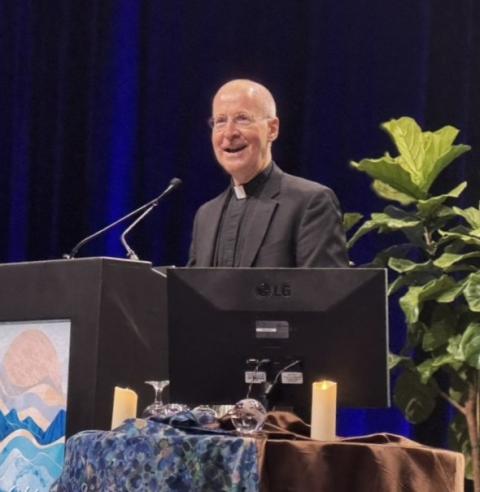
Jesuit Fr. James Martin delivers his keynote address during the 2025 LCWR annual assembly in Atlanta, Georgia, Aug. 14. (GSR/Helga Leija)
The reality Mary and Martha faced is one that I see so often in religious life these days. We could just as easily say, "Jesus, these women you love are ill!" And many times we wonder — or maybe it is just me — where is God?
Martin pointed out that Martha and Mary did not hold back their frustration at Jesus' delay. And Jesus did not soften the truth: "Lazarus is dead." He refused to say that Lazarus was only sleeping. The truth was, he was dead. Naming our losses plainly, sitting with them, accepting them — loss of ministries, lack of vocations, the deaths of friends and mentors — is some of the hardest spiritual work we are called to do.
Naming our losses plainly, sitting with them, accepting them — loss of ministries, lack of vocations, the deaths of friends and mentors — is some of the hardest spiritual work we are called to do.
He also noted that in nearly every artistic depiction of the resurrection of Lazarus, someone is holding their nose at the stench from the tomb. Martha had warned of it. Yet Jesus is always shown looking directly at that person — unflinching in the face of decay. He does not turn away from the stench of doubts, fears, or, in my case, grief.
Then came the image that stayed with me: Martin recalled a woman's insight that when Lazarus heard Jesus' call, he had to do something no one had ever done before: leave the tomb without knowing what resurrection meant. He stepped toward life simply because he knew the voice calling him.
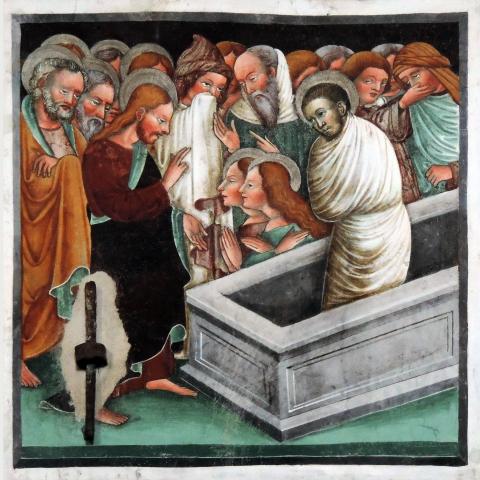
Resurrection of Lazarus - Fresco cycle about the Life of Christ, Oratorio dei Disciplini, Clusone, Lombardy, Italy. (Wikipedia Commons)
My sisters who have died knew that voice: the One who called them to monastic life and have called them home. I, too, have heard it. It calls me to stay in the tension of joy and grief, to remain present even when my instinct is to withdraw, and to trust that love is worth the narrow road. As the Prologue of the Rule of Benedict reminds us:
Do not be daunted immediately by fear and run away from the road that leads to salvation. It is bound to be narrow at the outset. But as we progress in this way of life and in faith, we shall run on the path of God's commandments, our hearts overflowing with the inexpressible delight of love.
We might be fewer, but this is the path I want to take — narrow now, perhaps filled with grief, but leading toward the day it will overflow with joy again.
A prayerful march for justice took the streets of Atlanta with "A Pilgrimage of Hope"
BY JOYCE MEYER
August 14, 6:10 p.m. ET
On the second morning of the annual assembly Aug. 14, to bring life to the LCWR theme — "Hope Unbroken: Journeying in God's Promise" — we engaged in a walking pilgrimage of hope. It had been many years since I was part of a march for justice, but this was more than a march: it was a pilgrimage of solidarity and prayer to confirm our shared commitment to countering racism, climate and earth destruction, and forced migration.
There was electric excitement as we gathered to begin this event, anticipating what this could mean for us. The rain of the night was receding, and it was still dark as we moved in quietness into the streets of Atlanta, supported by a street escort. On our pilgrimage, we stopped three times to pray and reflect together on our part in injustice and to recommit ourselves to ending racism, climate and earth degradation, and forced migration.
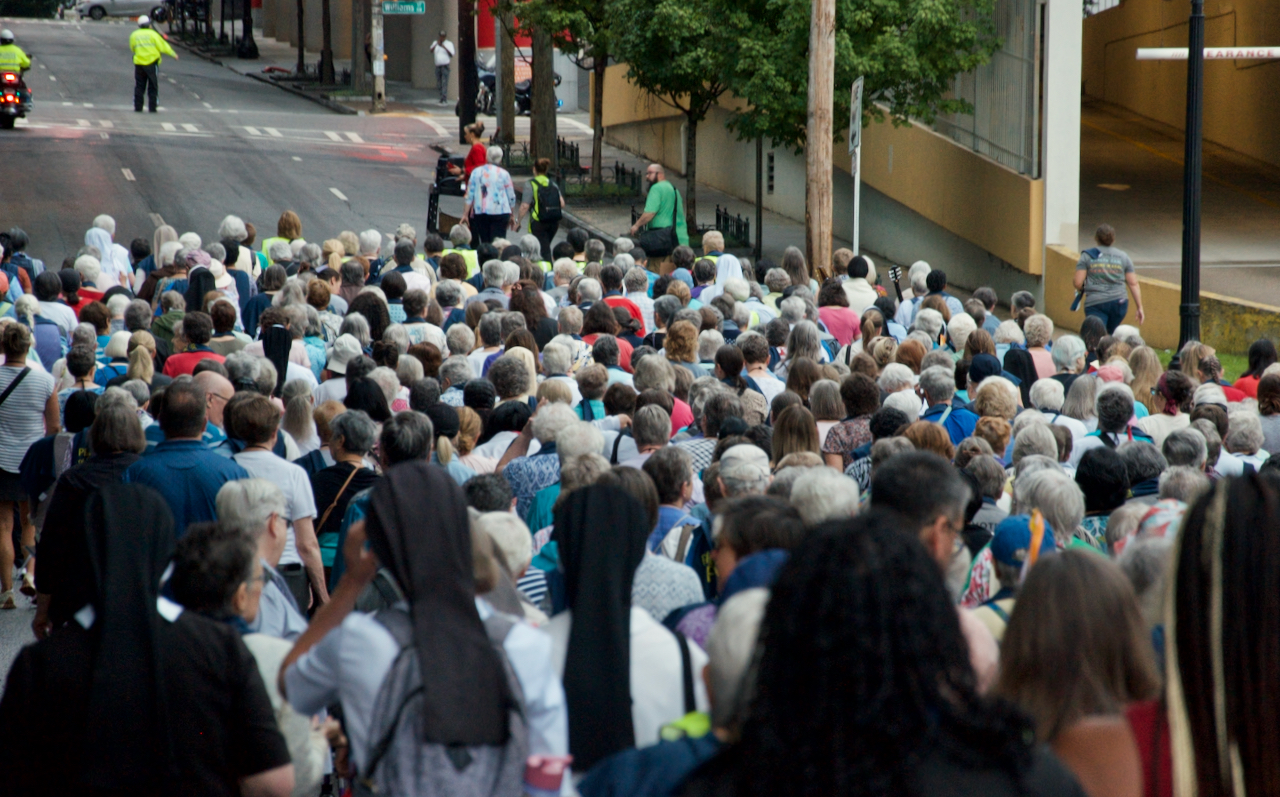
Several hundred Catholic sisters march through downtown Atlanta Thursday morning, Aug. 14, as they prayed and sang for social justice as part of the LCWR assembly being held here. (GSR/Dan Stockman)
Our first stop was to end racism. We sang We Shall Overcome, echoing the heart of Martin Luther King Jr.'s dream. We prayed Thea Bowman's prayer to have hearts of forgiveness — not just forgiveness of others, but also of ourselves. As we forgave ourselves, we moved from "I" to "we," sharing hope that we are one family.
We then moved on in silence.
Our second stop was to pray with and for our Mother Earth, and to change our own behaviors to counter climate change. We prayed with Francis of Assisi, praising God for the gifts of Brother Sun, Sister Moon, and all creatures of creation: air, water, fire, fruits, flowers, herbs, and animals of all kinds. We prayed for the suffering and even for death, an experience we all share as one family. We prayed to help bring about sustainable, integral development for all of creation. As we moved along again, the trees overhead blanketed us with small showers of leftover rain.
On our pilgrimage, we stopped three times to pray and reflect together on our part in injustice and to recommit ourselves to ending racism, climate and earth degradation, and forced migration.
Our third stop was with Our Lady of Guadalupe. We began by singing her praises and then asked her to walk with us as we accompany our sisters and brothers displaced or migrated to seek safety and well-being. We prayed to be partners with her in finding ways to be constructors of bridges, not walls, always ready to welcome, protect, and integrate everyone. We prayed to Our Lady of Guadalupe to help us reflect her tenderness and to be bearers of hope for all her suffering children.
We ended our mile walk through the streets of Atlanta with prayers to shift our consciousness to awareness of interdependence as a global village, and to become beacons of hope, compassion, and promoters of peace. We then sang our hearts out with "Let There Be Peace on Earth."
For me, the walk was a communal, contemplative prayer. I feel the physicalness of it will burn in my memory for a long time.
Thursday's panel focuses on global healing: "Violence can be policy, hunger, forced migration"
BY DAN STOCKMAN
August 14, 5 p.m. ET
The nearly 600 Catholic sisters and 300 guests attending the Leadership Conference of Women Religious' assembly took part in a panel discussion focused on the call to work for the healing of the world.
Non-violence, panelists said Thursday, Aug. 14, is much more than just a lack of violent action.
The panel, moderated by Franciscan Sr. Maria Elena Martinez, included Pastor Dameon Madison, of the Martin Luther King, Jr. Center for Nonviolent Social Change; Angelo Martinez, also from the King Center; and Tom Crick from The Carter Center.
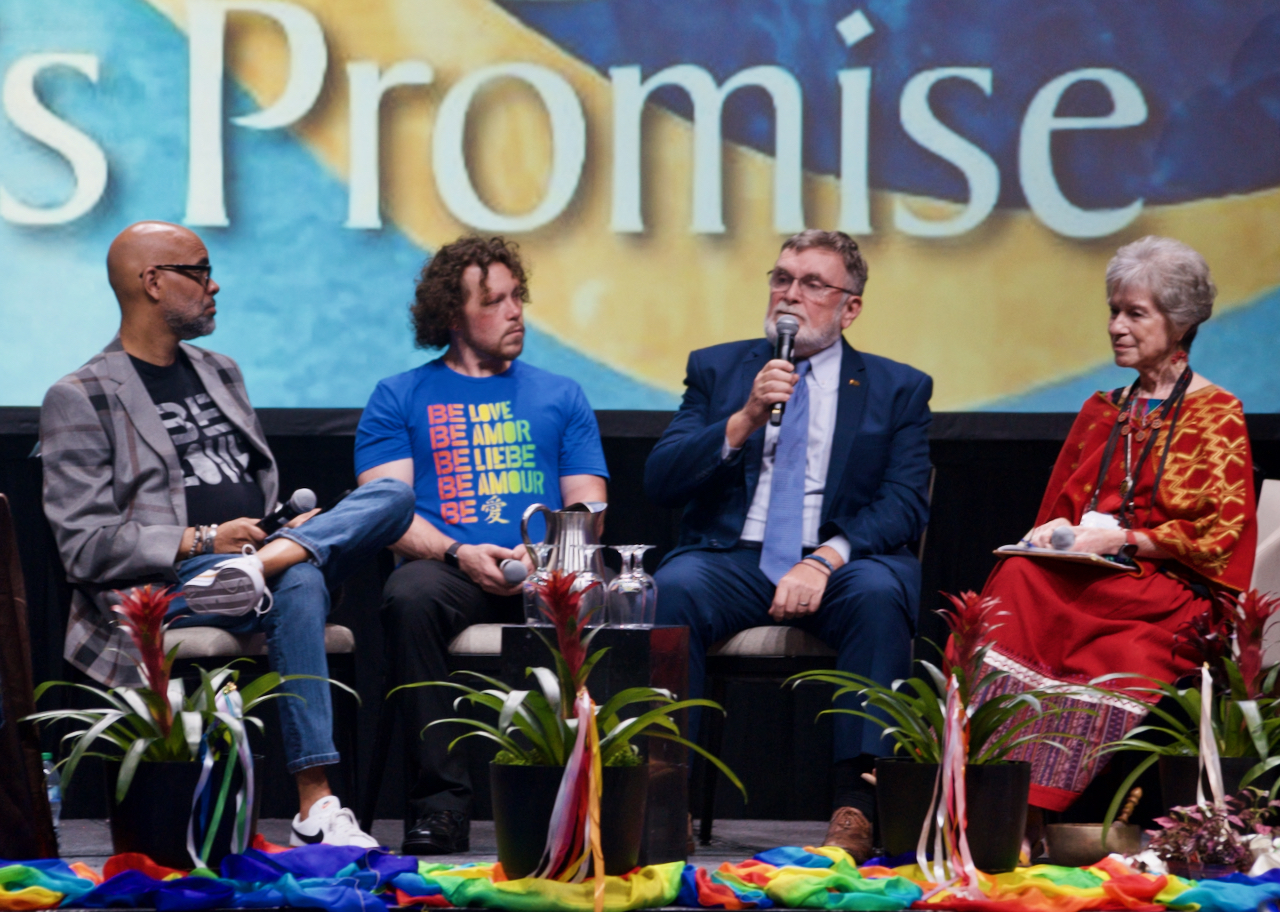
Members of a panel discussion on the call to work for the healing of the world, from left: Pastor Dameon Madison, of the Martin Luther King, Jr. Center for Nonviolent Social Change; Angelo Martinez, also from the King Center, and Tom Crick from The Carter Center speak Aug. 14 at the LCWR assembly in Atlanta. Moderating the panel is Franciscan Sr. Maria Elena Martinez. (GSR/Dan Stockman)
Crick spoke about The Carter Center's work and how all of the efforts toward social justice must be relational. Our society is incredibly polarized, he said, but we will never be able to change that as long as we demonize each other.
Madison said violence takes many forms.
"Violence can be policy, hunger, forced migration," he said.
But working to build the relationships Crick said are critical takes effort.
"Do I have the soul force to engage with someone who doesn't mean me well?" Madison asked. "How do I love my neighbor not just in a geographical context, but in a moral one? The most important work at this point is to have a conversation."
But changing others first requires us to change ourselves, he said. And we must be willing to truly listen.
"It's important that before we try to transform the external, that we transform the internal," Madison said. "It is very difficult to bring about transformational change when you dismiss someone's lived experience."
Thursday morning Pilgrimage of Hope a prayerful demonstration for social justice causes
BY DAN STOCKMAN
August 14, 4 p.m. ET
Hundreds of Catholic sisters shut down several downtown streets in Atlanta, Georgia this morning, Aug. 14, as they marched, prayed and sang for social justice.
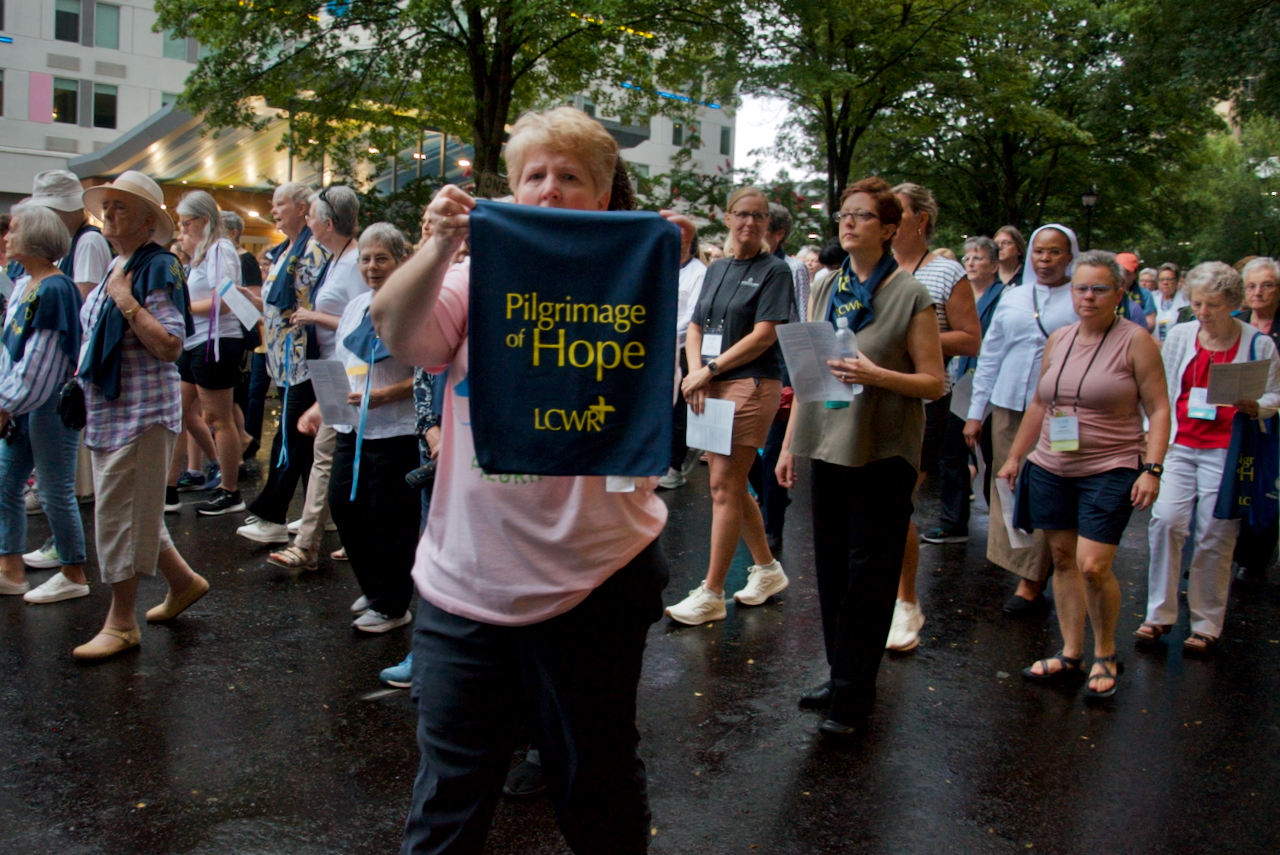
A participant in the Pilgrimage for Hope holds up a banner as several hundred Catholic sisters march through downtown Atlanta Thursday morning, Aug. 14, singing and praying for social justice, during the LCWR assembly. (GSR/Dan Stockman)
At least 400 sisters attending the LCWR assembly turned out at 7 am for the Pilgrimage of Hope, a walk of several blocks that served as their morning prayer and a symbolic stance against racism, climate change and forced migration, and an observation of the 10th anniversary of Laudato Sí.
With a police escort blocking traffic, the sisters walked through downtown, singing as they went, and stopping for prayers. One impatient driver expressed their frustration through their car’s horn; a police officer expressed her own frustration right back as she protected the sisters — some using walkers or oxygen. The sisters just smiled and waved.
Advertisement
Sr. Kathy Brazda's "Dread Is Not of God" spoke to my grief and hope
BY HELGA LEIJA
August 14, 12:50 p.m. ET
I almost didn't attend the LCWR assembly in Atlanta this year. The day before I was to leave, my former prioress, Esther Fangman — a Benedictine Sister of Mount St. Scholastica, a dear friend and mentor — died. She had been my rock through my transfer to monastic life, helping me weather storms that I could not have navigated alone.
St. Joseph Sr. Kathy Brazda, delivers the presidential keynote address during the 2025 Leadership Conference of Women Religious annual assembly in Atlanta, Georgia, Aug. 13, 2025. (GSR/Helga Leija)
In her honor, I came anyway, because she was a strong advocate for training and education for women. Today's presidential address by St. Joseph Sr. Kathy Brazda confirmed that decision. Her words, "Dread is not of God," were exactly what I needed to hear as I try to do my work with Global Sisters Report while carrying a relentless grief that is pressing to be acknowledged.
As a sister under 50, it's hard to put into words the fear and loss I feel when elders, leaders, and mentors die. These are the ones who have guided me, shaped me, and steadied my steps. As I see them go, I find myself asking: Who will be left to guide me if I am called to lead?
Brazda spoke of being diagnosed with cancer at the start of her first year in LCWR leadership. She recalled wondering, "How can I plan for a future when I don't know if I'll even be a part of it?" Yet in that uncertainty, she learned to receive — from her elders, from the LCWR leadership team, from her congregational leadership team.
Advertisement
Her reality "reshaped" her leadership, she said. And my reality too, is being reshaped by loss. Death did not take Esther from us — it deepened the ways she will continue to shape my life and the community's future.
Brazda reminded us that the most significant leadership lessons don't come from workshops or retreats, but from lived experience, and from choosing to stay rooted in hope, even when the path ahead is unclear. Esther always told me: "When in doubt, always choose to love."
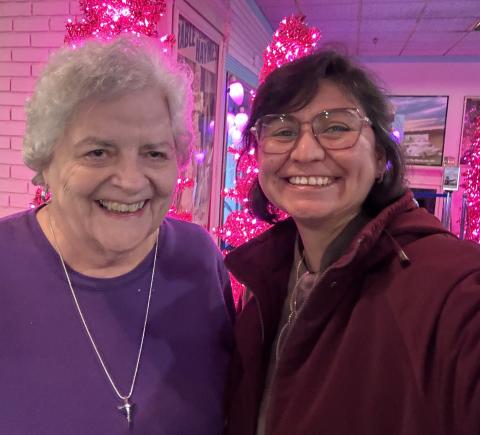
Benedictine Sisters of Mount St. Scholastica, Esther Fangman and Helga Leija, after watching the movie Conclave in 2024. (GSR/Helga Leija)
Sometimes it is unbearably hard, but those moments are the lessons that shape us most. Esther's life and death have been both the best and worst of times for me: joy and grief woven together. Brazda reminded us that to "bring to birth an alternate way of being in the world" requires entering wholeheartedly into both, making room for God to work through our vulnerability. In these days of loss, that is the only way I know how to live.
So, I offer my loss to God. And, as the Trappist monk Thomas Merton wrote, and Brazda quoted, my prayer is that I may "become a window through which God shines" — even now, with grief as my companion, and hope as my choice.



